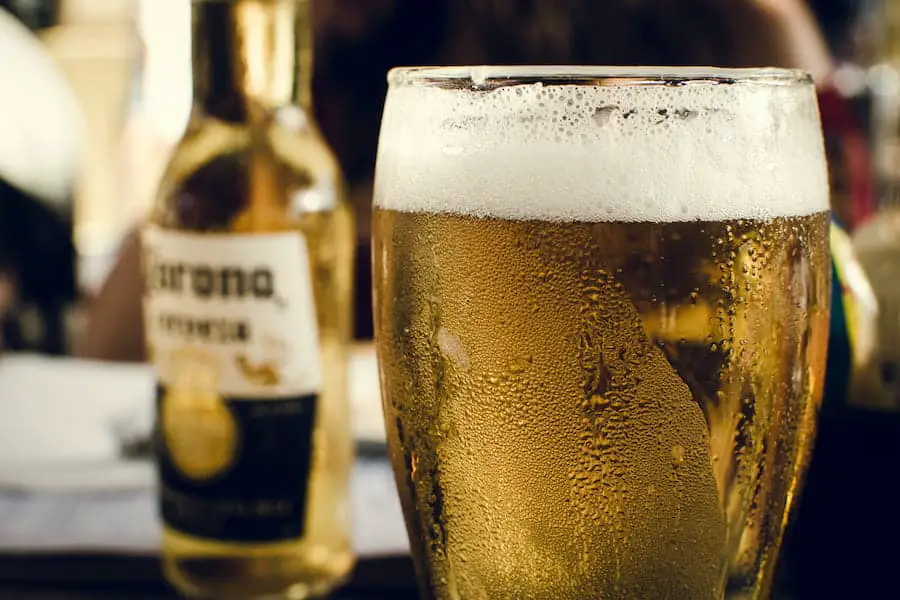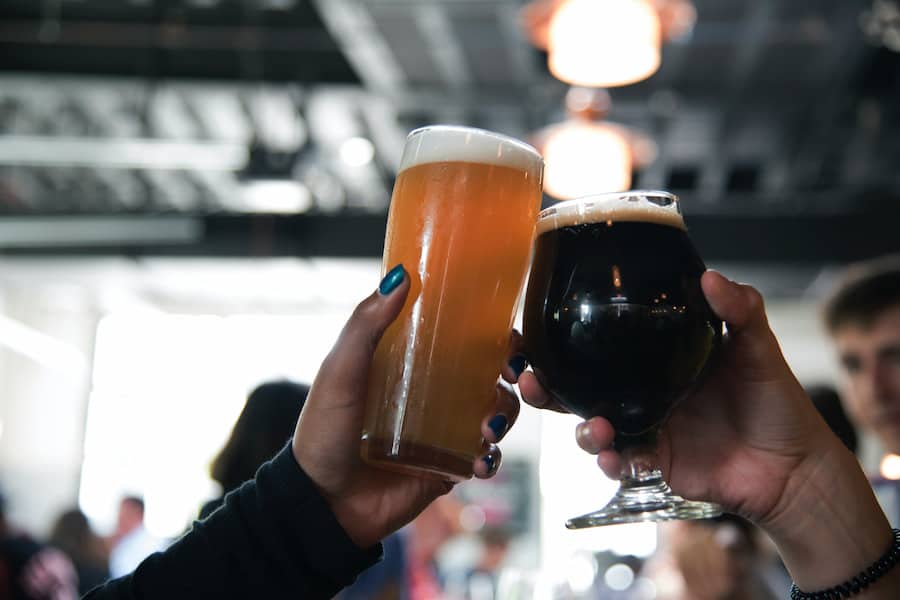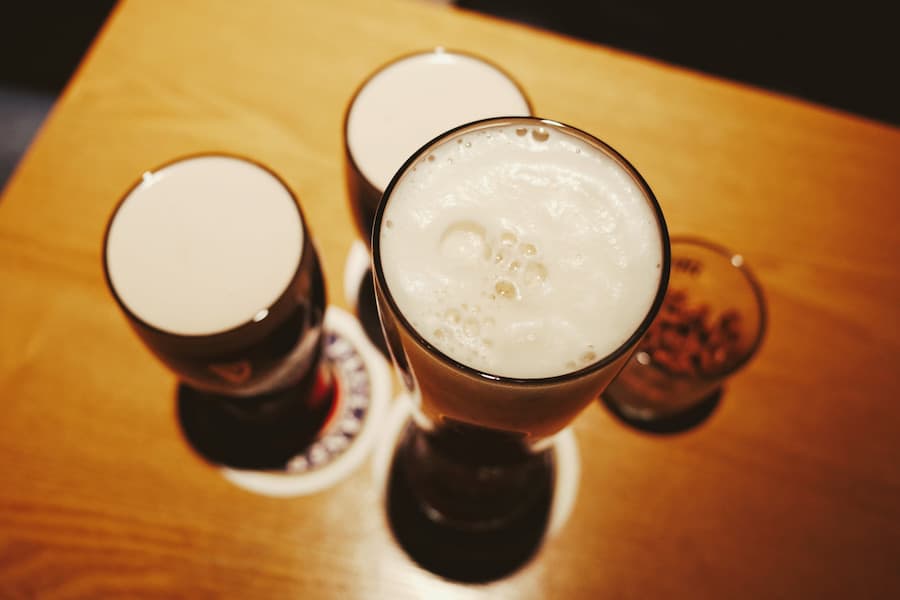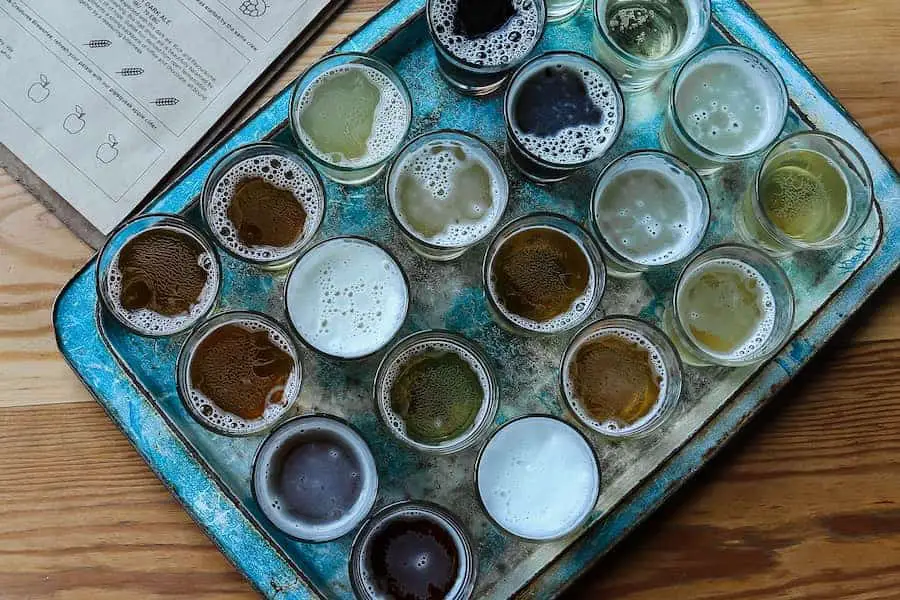If you buy something through a link in our posts, we may get a small share of the sale.
There are times you pick up an old bottle of beer that you have forgotten about. You are unsure about drinking it. You have doubts about what drinking it will do. You want to know if old beer can go bad and more importantly, can bad beer make you sick?
Contents
Can Bad Beer Make You Sick?
No, bad beer can’t make you sick. While drinking beer after its expiration date isn’t the most ideal thing to do, you shouldn’t experience any problems either. The major downside is that the beer would have likely lost its flavor. Aside from that, it is relatively safe to drink bad beer.
That is not to say there are no side effects, you may get an upset stomach and probably a feeling of disgust and irritation after drinking. You could opt to avoid drinking beer that shows no signs of carbonation or white foam after pouring because these are the primary indicators of freshness.

Can Beer Go Bad?
If you had a beer you thought to have gone bad, there’s a possibility that it’s only tasting stale or flat. This is usually the condition of beers that have passed their expiration date or best by date. Once it’s past its expiration date, beer would start to lose its original taste and flavor.
This does not mean it has gone bad. Beer is made through the processes of brewing and fermentation. So, once it is made, it cannot go bad because bacteria cannot get inside it. The high level of alcohol in the beer also acts as a natural defense system against pathogens.
This implies that beer rarely ever goes bad. It just becomes stale and tastes flat after the expiration of its shelf life. Technically speaking, you can choose to drink a 50-year-old beer and not have to worry about getting sick. This is under the assumption that it has not been tampered with or contaminated.
To fully understand how beer goes bad, let me take a look at how it is made.
How Beer Is Made
Beer is made from brewing a cereal grain, typically malted barley, with water and yeast. The mixture is then left to ferment. This process allows for natural carbonation which is how beer derives its unique fizz.
The fermentation process that beer undergoes prevents it from the development of any harmful bacteria. Longer periods of fermentation can impact the taste of beer causing it to be sweeter.
Oftentimes, after being produced, beers are pasteurized. This is a process of using heat treatment to sterilize different food products, including beer. It ensures that any harmful pathogen in the beer is killed off. The beer is then stored away before final consumption.

Factors That Influence the Taste of Beer
Asides from fermentation and pasteurization, there are a few other factors that can contribute to the taste of beer and influence the taste of the beer over time.
Hops
Sometimes, hops or flowers from the hop plant can be added at the end of the brewing process. This helps in balancing the natural sweetness that comes with the grains used in making beer. It also influences the aroma and flavor of the beer by giving it floral, bitter, or citrus notes.
Hops help in stabilizing and preserving the beer. They are now a common way of enhancing the flavor of a wide variety of beers. However, they can significantly affect the taste of the beer as it ages.
After breaking down, hops are converted into a very bitter by-product. This by-product makes the beer bitter over time. While it is still safe for drinking, the beer starts to taste really bitter.
Oxidation
Oxidation in beer occurs when the beer is exposed to oxygen. Oxidation is generally considered to be a ruinous process to beer. This is because of the change it causes in the flavor of the beer. It tends to make the beer taste stale faster.
When beer becomes oxidized, the natural flavors get lost. This causes the beer to start tasting like cardboard or paper in some instances. In some other instances, depending on the specific ingredients used, the beer may begin to taste like a cleaning liquid.
However, you should keep in mind that these off-tasting flavors do not indicate that the beer is dangerous to drink at all. The beer is perfectly safe to drink. It just might not be pleasant to taste.

How Long Does It Take Before Beer Goes Bad?
The easiest way to tell if the beer has gone bad is to check if it is past its expiration date. The expiration date labeled on the bottle is an estimate of when the beer’s shelf life will be exhausted. It does not mean the beer has spoiled, it just indicates that the beer probably already tastes stale.
There are certain factors that influence how long it takes before beer begins to go bad. It is necessary to understand how these factors help you judge the age of your beer better.
They include:
- Level of alcohol in the beer
- Storage of the beer
- Type of container the beer is in
- Pasteurization of the Beer
Level of Alcohol in the Beer
Beers that have a low ABV (alcohol by volume) will begin to go flat within around six months of being stored unopened on a shelf. On the other hand, beers that have a higher ABV, typically higher than 8%, like stouts or lambics, last longer on the shelf unopened.
They even tend to improve in taste if they are stored properly.
Storage of the Beer
If beer is store sealed or unopened, it is capable of staying as long as six to eight months after its best by date and it can last longer if it is refrigerated. In contrast, beer has a shorter shelf life span once it has been opened, even if it is refrigerated.
Beer begins to taste flat and stale because it has lost its carbonation. The carbonation is responsible for the crispy and refreshing taste that beer has.

Type of Container the Beer Is In
Canned beers stay fresher longer than bottled beers. Beers stored in darker bottles tend to have a longer shelf life than beers stored in lighter bottles.
Pasteurization of the Beer
Unpasteurized beer has a significantly short shelf life. You should consume them within three months to enjoy the best flavor. Pasteurized beers can remain fresh for as long as a year after bottling.
Mass-produced beers are typically pasteurized, but most crafted beers are not in a bid to preserve the taste. This is because a lot of brewers believe that pasteurization affects the taste of the beer.
What Causes Beer to Skunk?
Did you notice an unpleasant smell when pouring out your beer? If you perceive a putrid smell when you open your beer, chances are that your beer has started skunking. However, skunking is not caused by the aging of the beer.
Skunking typically occurs in beer when it is left exposed to sunlight or any other form of UV light for an extended period of time. This exposure causes a chemical reaction in the beer that causes the flavor to drastically change. This alters the taste and the smell, causing the beer to have an awful odor.
If you store your beer under proper conditions like in a fridge or in a cool dark place, you do not have to worry about the risk of the beer skunking. This, however, does not mean the flavor will remain unchanged after an extended period of time.
Should You Drink Skunked Beer?
Skunked beer may be disgusting in terms of the taste and the smell but it is not unsafe to drink. It is probably hard to believe that but it is true. I do not know why anyone would want to drink skunked beer considering the beer is meant to be enjoyed.

Can You Drink Expired Unpasteurized Beer?
No! Expired unpasteurized beer might be the only exception to this rule. Drinking expired unpasteurized beer can actually make you sick. This is because unpasteurized beer is meant to be consumed while they are still fresh.
Tips on How to Prevent Your Beer From Going Bad
Here are a few tips on how to prevent your beer from going bad:
- Store your beer in a cool and dark place away from direct light or sunlight. If there is one thing beers do not like, it is light. Consider choosing beers packaged in dark bottles preferably. They are more suitable for long-term storage.
- You can choose to store your beer using a can or keg. Both options are fine and work well. They are impenetrable and will keep your beer safe. Store your beer bottle with their caps in an upright position. You should store beers on their sides because they are not wines that have corks.
- Ensure that where you are storing the beer is somewhere with a constant temperature, such as a refrigerator.
Related Questions
How Can You Tell Beer Is Bad?
Your beer is bad when it begins to taste very weird or sour like sewage, sulfur, or cooked cabbage. There are a lot of different beer flavors available but you should be able to tell if the flavor you are tasting is unintentional.
Is Sediment in Beer Okay?
Sediments in beer are not typically a bad sign. It could be because the beer was not filtered or because of bottle conditioning. They are safe to consume except when they look like dandruff, which is a sign that the beer is too old.
Conclusion
As a rule of thumb, your beer is safe for drinking even after the expiration date. This is as long as it has not been contaminated. However, old beer is likely going to taste bad. Beer is meant to be enjoyed. For that reason, you can stick to drinking fresh beer for the best taste and flavor.

